Our Sin-Drenched Nation

Recently I had the pleasure of presenting a paper on "godly nationalism" at the annual meeting of the Wesleyan Theological Society. This gathering, with its many scholars and students committed to Methodist theology, is greatly encouraging. My paper compared John Wesley as loyal Englishman to Pope John Paul II, who equally loved his native Poland. Both understood that nations were divine gifts with providential purposes, but neither of course was naive about national sins. Wesley especially expressed his patriotic love by denouncing Britain's many sins, even as he thought his country blessed and great.
Several questions I got afterwards from young people in the audience were revealing. One asked if Christians must love countries like America and Israel founded on "stolen" land. Another similarly asked if American Christians must love their country built on greed. Still another skeptically asked about loyalty to a racist nation like America. An older man, who identified as a chaplain in the National Guard, interjected he would die and kill in defense of the Constitution, provoking visible horror from the negative questioners.
All nations are drenched in sin, I responded, yet we are called to love and serve the community where God has placed us, just as Christ Himself did. And we should recall that, unlike Christ, we are ourselves sinful, each of us actively contributing to the faults of our own societies. So we should judge our nations, present or past tense, modestly and reluctantly. Smug contempt for our own people can be self-righteous.
Contempt specifically for America, including among many Christians, especially in academia, reflects partly the dominance of the Howard Zinn perspective, which chronicles American history as primarily a catalog of repressions. These recalled injustices are often very real, but the distortion is tagging America as uniquely perfidious, racist, sexist, greedy, militarist, etc. America is sinful, like all nations, but it never had a monopoly on sin. And more often than not, American ideals have provided a level of human justice unusual in world history.
The Christians who disdain America often suffer from particular theological confusion, believing humanity basically good, while America is the odious aberration. They are also, ironically, often themselves persons of privilege, attending or teaching at expensive and prestigious academic institutions even as they lament America's exploitation of the marginalized. Their harsh critique contrasts vividly with less privileged persons, for example the many African immigrant taxi drivers, Christian and Muslim, with whom I often converse, who seem generally very favorable about America, having lived elsewhere where human justice is more diluted.
Anti-American Christians often are very myopic about USA sins while uninformed about gross inhumanity elsewhere. They might know about the Holocaust but are often clueless about tens of millions liquidated by the Soviet Union and communist China, about genocides from Pol Pot and Mengistu's Ethiopia, or mass murder and cannibalism by Idi Amin and Emperor Bokassa, about the Rwandan genocide, or the torture chambers of Saddam Hussein, North Korea, the Assads, Kaddafi, or scores of other regimes whose crimes were vicious but tragically unexceptional.
The routine corruption, political oppression, racism, prejudice and casteism that plague most societies usually far more pervasively and destructively than in America are mostly unknown to the type of young Christians who asked me the negative questions at WTS. But these scoffers from the left side of the political spectrum are increasingly joined by some conservative Christians who imagine America, which previously was supposedly righteous, is now decadent, perhaps beyond redemption.
I don't believe America is worse today than in the past. Every sin prevalent today was present in the past, often more pervasively and destructively, including assaults on family, marriage and vulnerable human life, unborn or otherwise. My own constant reading of history always reminds me both of America's greatness and its shame.
Last weekend biographer Michael Burlingame gave a fascinating talk at Fords Theater on "Abraham Lincoln and African Americans." (Watch here.) There's a full-time Christian activist who speaks to major Evangelical groups about American racism as supposedly embodied in the Declaration of Independence and who recently has been denouncing Lincoln as a rabid racist. This uninformed activist should heed Burlingame, who describes Lincoln's remarkable challenge to racism of his day, which stunned and irritated even his most supposedly enlightened anti-slavery allies. For example, when Lincoln welcomed blacks to the White House as equals, extending basic courtesies, onlookers commonly and openly seethed. That Lincoln was shot to death by Booth specifically because he advocated voting rights for blacks apparently counts for little with the contemptuous Christian activist who smugly lectures attentive Evangelicals.
We are a sin-drenched country, but we are by divine grace a much better country than then in almost every way. They who disdain our country by holding it to an inhuman or unparalleled standard are perhaps guilty of ingratitude as well as sanctimony. This derision, which comes from Christians left and right, now dangerously questions democracy itself, while offering no plausible alternative. The available alternatives to American democracy are actually quite hideous.
I offered my WTS proposal for "godly nationalism" as a summons to gratitude, realism, and constant societal reformation. Our attitude towards nation should be service and critique guided by love, not contempt.
Originally posted at IRD's blog.





















